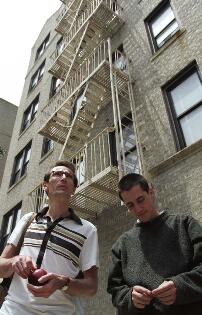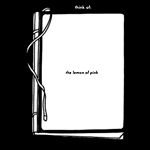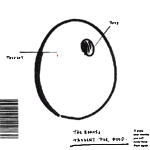Benevolent Chaos: An Interview With The Books
by dave heaton
 Can puzzles and mazes comfort you while they leave you befuddled (can you feel both like you're lost in the universe and you've finally found your home)? Listen to Thought for Food and The Lemon of Pink - The Books' two albums (both on Tomlab) - and you'll feel that way, blissfully confused. Nick Zammuto and Paul de Jong use cello, guitar, banjo, samples of who-knows-what (spelling bees, scenes from films, doors slamming, crowds cheering - a world of sounds that could come from anywhere), and occasionally people singing beautifully, quietly, to create music that's sort-of a new form of folk music, an electronic-acoustic hybrid, forward-looking experimental pop music, a wacky art project...all of these things really, and none of them. It's a blessed riddle, music that's exciting and extremely pleasing to the ear. Impossible to define (or confine) yet extremely inspiring. The interview below is a friendly attempt to probe Nick and Paul's brains a bit, to get at what drives the wondruous music of the Books.
Can puzzles and mazes comfort you while they leave you befuddled (can you feel both like you're lost in the universe and you've finally found your home)? Listen to Thought for Food and The Lemon of Pink - The Books' two albums (both on Tomlab) - and you'll feel that way, blissfully confused. Nick Zammuto and Paul de Jong use cello, guitar, banjo, samples of who-knows-what (spelling bees, scenes from films, doors slamming, crowds cheering - a world of sounds that could come from anywhere), and occasionally people singing beautifully, quietly, to create music that's sort-of a new form of folk music, an electronic-acoustic hybrid, forward-looking experimental pop music, a wacky art project...all of these things really, and none of them. It's a blessed riddle, music that's exciting and extremely pleasing to the ear. Impossible to define (or confine) yet extremely inspiring. The interview below is a friendly attempt to probe Nick and Paul's brains a bit, to get at what drives the wondruous music of the Books.
Why make music?
Because we have ears. Why write about music?
To what degree is it important to keep listeners in a state of confusion.
Not really confusion. More of a gentle disorientation. Like playing in the waves at the ocean, its part active, part passive. Disorientation can be useful because it naturally encourages reorientation, which is ultimately a centering process.
Please react to the following words in relation to your music:
randomness
Not really randomness. More like chaos. Benevolent chaos. Like fractals. Too complicated to understand but it looks nice anyhow, like a lone cranberry floating through the grand canyon after a desert rain.
nonsense
Nonsense but not no sense. Sometimes there is a more profound 'sense' in nonsense than there is in 'regular' consensual sense. Because its not straightforward, its more intuitive, there is room to breath, and it's always more funny.
surrealism
Free association: We have a record called 'Think and Grow Rich', The guy says 'Your subconscious mind works night and day.' Then he goes on to say something like 'the fourth principle is the eighth principle, the third principle is the first principle, and the thirteenth and final principle is the sixth sense.' We also have a record called 'Autogenic Reducing Method' which is a subconscious method of losing weight. He says things like 'With your eyes closed, close your eyes'. When you do this, not only do you lose weight, but you also become a surrealist.
mood
Mood is a quality of sound, like pitch, timbre or volume. It oscillates around silence just like a sound wave compressing and releasing. Its the rate of change of the rate of change, the second derivative. It's one parameter to consider in the craft of making music.
 How does what you're doing relate to jigsaw puzzles, or collages.
How does what you're doing relate to jigsaw puzzles, or collages.
Collages are great, they take many things and turn them into one thing. (a step in the right direction, unless you are a megalomaniacal corporation). Our friend Jorge said: If you emptied 50 jigsaw puzzles onto your kitchen table, blindfolded yourself and put all of the pieces together by faith and instinct, sweating over the smoothness of each connection, working at it and working at it until finally you were finished, confident that each piece was precisely where it was meant to be, and after all that effort, you took a deep breath, removed your blindfold, looked at your work...and saw something new, something inexplicable and strange and overwhelmingly comforting, something that felt exactly, impossibly, right, then you would have 'The Books'. (Well, actually, we changed the end, but isn't it flattering that he would say that?!)
What is the role of humor in your music. Is it an appropriate reaction for your listeners to laugh?
There are many kinds of laughs, they all seem to come from different places in the body. In fact we have quite a nice collection of laughs. Nick's mom is an ongoing contributor to one of the most infatuating partitions on our harddisks. A sure way we can tell when a track is going well: we laugh, or at least smile. It keeps the collaboration healthy.
On the other hand, we expect our listeners to be completely stoic and serious, to abstain from psychotropic substances, and to fast for several days before listening to our music. Just kidding, you can do whatever you want to do while listening to 'the books'. We're just thankful that anyone listens at all. Please laugh, even if only in jest.
Your website is fascinating. What is the capacity of the internet as an artistic medium?
Thank you, it was fun to make. It was therapeutic to work with images after finishing the record. It seems to be pretty big, the internet. Like any medium it has great potential to be used in subtle and beautiful ways. Like other new media, there is still a lot of unexplored territory, which is exciting. It's definitely not a panacea, mostly because its not edible. The best part is the freedom and the reach. The challenges are bandwidth limitations and format issues. It feels bad to sacrifice quality for speed, but its the way of the world, a balance of blessings and curses.
 For you, what meaning is there in collecting the sounds around you? are you
interested in collecting sounds for the sake of collecting them, or do they
only take on meaning when you use them in a song?
For you, what meaning is there in collecting the sounds around you? are you
interested in collecting sounds for the sake of collecting them, or do they
only take on meaning when you use them in a song?
Collecting is in our blood. Some people are just collectors. Paul's grandfather for instance, even to the extent that when his wife would give him money for a new suit, he'd invariably return home with an antique or an old print he'd found and wear his old suit for another year. We're not collecting to own. Our sound collection is like an orphanage and we are its caretakers. The sounds by themselves have a meaning, of course, but the really interesting moments start to happen when they are placed in a track and they start to build unexpected relationships with their surroundings. In that way the focus of attention can shift a bit from their raw form, but only because their inherent qualities get amplified, or purified by the context they are placed in.
How excited are you by sample heavy music being made today?
For no good reason, our meandering listening habits haven't taken us in that direction too much. Perhaps you'll have some suggested listening for us. One definite prerequisite for getting excited about 'sample' music would be that the source material is treated with love and respect, and that the music elevates the samples rather than painting them negatively. Also, defining 'sample heavy' music as such seems to be a fairly limited way of looking at things. The idea of 'genre' hasn't been very useful to us. If we look hard enough, pretty much wherever we go we turn up compelling and moving things. If it inspires us, then it's good, whatever its origins may be. One good thing leads to the next.
What is the earliest music you remember as a child? Does any of it in any way relate to what you are doing now?
Nick: I grew up near Boston so it was classic rock, all day, every day. I think the first song I remember singing along with in my parents car was that Creedence song, 'rollin' on a river' (proud mary.) I think I am still strangely drawn to those kind of anthemic rock structures. I've never had any formal music training, so I think I must have picked up most of my harmonic and rhythmic sensibilities from the pop music of the late 70's.
Paul: It probably leads back to a small stack of 45 rpm's I had next to a record player in my room since I was five. I would listen to them over and over again: excerpts from Bach, Dvorak, Czech folk music, the Beatles, medical records with heartmurmurs, advertisement flexidiscs. My family loves and plays classical music, there was radio and concerts, and I played the cello myself every day. So I got exposed to all kinds of music in a wide variety of forms, settings and situations, and I had the fortune to internalize that material even before I consciously learned it. It went straight to the heart if I liked it. I still listen very much in the same way as I did then.
If you could have one living artist (in any field) attempt to make a visual representation of The Lemon of Pink who would you choose and why?
Ann Hamilton. Because her work is impossible to describe, it's better just to see it for yourself. It activates all parts of the mind, and ultimately enriches the rest of one's experience in the world at large.
{Website: www.thebooksmusic.com. Note: Leave out the "the" and you'll get a warning of the apocalypse.}
Copyright (c) 2005 erasing clouds |
Photo at top taken by Nino P. |